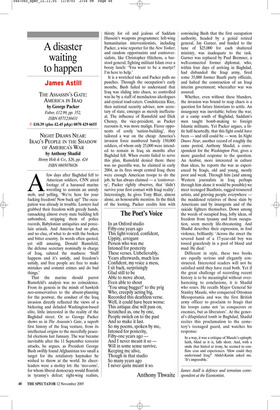A disaster waiting to happen
James Astill
THE ASSASSIN’S GATE: AMERICA IN IRAQ by George Packer Faber, £12.99, pp. 352, ISBN 0571230431 ✆ £10.39 (plus £2.45 p&p) 0870 429 6655 NIGHT DRAWS NEAR: IRAQ’S PEOPLE IN THE SHADOW OF AMERICA’S WAR by Anthony Shadid Henry Holt & Co., $26, pp. 424 ISBN 0805076026 Afew days after Baghdad fell to American soldiers, CNN aired footage of a harassed marine wrestling to contain an unruly mob, and yelling, ‘We’re here for your fucking freedom! Now back up!’ The occupation was already in trouble. Looters had grabbed their freedom with greedy hands, ransacking almost every state building left unbombed, stripping them of police records, Babylonian antiquities and porcelain urinals. And America had no plan, and no clue, of what to do with the broken and bitter country. In words often quoted, yet still amazing, Donald Rumsfeld, the defense secretary nominally in charge of Iraq, saluted the madness: ‘Stuff happens and it’s untidy, and freedom’s untidy, and free people are free to make mistakes and commit crimes and do bad things.’ That the marine should parrot Rumsfeld’s analysis was no coincidence. From its genesis in the minds of hawkish neo-conservatives to the absent-planning for the postwar, the conduct of the Iraq invasion directly reflected the views of a bickering and deluded Washington-based elite, little interested in the reality of the Baghdad street. Or so George Packer shows us in The Assassin’s Gate, a superb first history of the Iraq venture, from its intellectual origins to the mercifully peaceful elections last January. The war became inevitable after the 11 September terrorist attacks, he argues, as President George Bush swiftly found Afghanistan too small a target for the retaliatory haymaker he wished to throw at the world. Its cheerleaders were a motley lot: the ‘neo-cons’, for whom liberal democracy would flourish in tyranny’s defeat; right-wing realists, thirsty for oil and jealous of Saddam Hussein’s weapons programmes; left-wing humanitarian interventionists, including Packer, a wise reporter for the New Yorker; and random opportunists and controversialists, like Christopher Hitchens, a barstool general, fighting militant Islam over a boozy lunch: ‘You want to be a martyr? I’m here to help.’ It is a wretched tale and Packer pulls no punches. Through the occupation’s early months, Bush failed to understand that Iraq was sliding into chaos, so controlled was he by a staff of mendacious ideologues and cynical toad-eaters. Condoleezza Rice, then national security adviser, now secretary of state, emerges as merely ineffectual. The influence of Rumsfeld and Dick Cheney, the vice-president, as Packer recounts it, was more malign. Fierce opponents of costly ‘nation-building’, they tailored a war on the cheap: America’s invasion force numbered barely 150,000 soldiers, of whom only 25,000 were intended to remain in Iraq six months after Baghdad fell. When events failed to serve this plan, Rumsfeld denied them: there was no guerrilla war, he claimed in early 2004, as its fires swept central Iraq; there were enough American troops to do the job, he has always claimed — a ‘controversy’, Packer rightly observes, that ‘didn’t survive your first contact with Iraqi reality’. Interestingly, he gives Tony Blair, almost alone, an honourable mention. In the thick of the looting, Packer credits him with convincing Bush that the first occupation authority, headed by a genial retired general, Jay Garner, and funded to the tune of $25,000 for each shattered ministry, was inadequate to the task. Garner was replaced by Paul Bremner, a well-connected former diplomat, who, within four days of arriving in Baghdad, had disbanded the Iraqi army, fired some 35,000 former Baath party officials, and halted the construction of an Iraqi interim government; whereafter war was assured.
Whether, even without these blunders, the invasion was bound to reap chaos is a question for future historians to settle. An insurgency was inevitable; before the war, at a camp south of Baghdad, Saddam’s men taught bomb-making to foreign Islamic militants. Yet Packer argues, a little half-heartedly, that this fight could have been — and still could be — won. In Night Draws Near, another record of roughly the same period, Anthony Shadid, a correspondent for the Washington Post, gives a more guarded response to the question. An Arabist, more interested in culture than ideas, he reports the war as experienced by Iraqis, old and young, mostly poor and weak. Through him (and among Western journalists in Iraq perhaps through him alone it would be possible) we meet teenaged Baathists, ragged-trousered artists, and grieving people everywhere the maddened relatives of those slain by Americans and by insurgents and of the suicide fighters themselves. Down among the weeds of occupied Iraq, lofty ideas, of freedom from tyranny and from occupation, seem merely life-threatening. And Shadid describes their expression, in foul violence, brilliantly: ‘Across the street the severed hand of a 17-year-old boy was tossed gracelessly in a pool of blood and mud. He died.’ Different in style, these two books are equally serious and elegantly constructed. Interested readers will not be satisfied until they have read both. Yet if the great challenge of recording recent history is to be meaningful without overhastening to conclusions, it is Shadid who soars. He recalls Major General Sir Stanley Maude, who conquered Ottoman Mesopotamia and was the first British army officer to proclaim to Iraqis that his troops came not ‘as conquerors or enemies, but as liberators’. At the general’s dilapidated tomb in Baghdad, Shadid recites this proclamation to the cemetery’s teenaged guard, and watches his response:
In a way, it was a critique of Maude’s epitaph: faith, blind as it is, falls short. And, with a smile that hinted at irony, he seemed to conflate eras and experiences. ‘How could they understand Iraq?’ Abdel-Karim asked me. ‘It’s impossible.’



























































 Previous page
Previous page